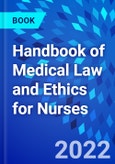In an increasingly legalised healthcare environment, this new handbook provides an essential guide to nursing professionalism in the context of the law.
With a professional career undertaking various healthcare-related roles, the author is both a mental health and general nurse who takes the reader through the workings of the legal system and how nurses can apply the law in an ethical and principled way. The handbook helps the reader to consider complex issues such as biomedical ethics, human rights, negligence and the importance of confidentiality, and provides guidance on decision making when faced with legal or ethical dilemmas.
Easy to understand and peppered with numerous practical examples throughout, the Handbook of Medical Law and Ethics for Nurses will support development of the essential legal awareness needed by undergraduate and post-graduate nurses alike.
- Easy to read - suitable for pre-registration nurses as well as practising nurses, midwives and nursing associates
- Illustrated throughout with case study vignettes and linked to relevant legislation in England
- Links to case law to improve understanding of the legal system
- Covers hot topics and debates, supporting nurses to participate in appropriate and effective decision making
- Supports learning in nursing modules covering professional practice
Table of Contents
Introduction to the Law - background to the Law, how it has evolved, the current UK legal frameworkProfessionalism - fundamental concept crucial to the protection of the public and individual patients, particularly when they are vulnerable children or adults. It is essential that nurses understand professionalism in the context of the law, standards and boundaries. This chapter explains how nurses are accountable and answerable for their actions by elements of criminal, civil and contract law. Professional regulation is then discussed in the context of protecting the public from nurses whose fitness to practice is called into question.
Equality and Human Rights - understanding the rights, dignity and freedoms of others and recognize the health needs of the diverse cultures that make up population in the West. Explains how the law promotes equality and human rights in the health service and explains how nurses must not discriminate on the grounds of race or disability.
Consent to treatment - nursing care may be delivered in an intimate 'hands on' way and nurses need to understand the need for real consent within this context. The chapter also discusses how the Mental Capacity Act protects vulnerable adults and young persons by regulating how decisions can be made on their behalf. The chapter looks at when it is lawful to withhold treatment and the duty to provide end of life care.
Mental health - the position of the patient with mental health problems is now regulated by a number of laws that seek to protect vulnerable children and adults. All branches of nursing need to understand and know how to apply this legislation.
Vulnerable adults - how to identify vulnerable adults or children and take action if you think they are being abused or exploited.
Consent and children - explains the differing requirements as the child passes through different developmental stages into adulthood.
Safeguarding children - nurses have a role in the identification of children who are being abused or who are at risk of abuse. This chapter looks at the Children's Act 1989 and 2004 and explains when to refer a 'child in need'.
Record Keeping - this chapter explains how records are kept to show that nurses have discharged their legal and professional duties.
Confidentiality - while confidentiality is a key part of professional conduct it is not absolute. This chapter will explain when the duty of confidentiality can be overidden and information disclosed properly to another. Social media is included in this chapter.
Health and Safety - the HSAWA 1974 is clearly explained in the context of keeping both staff, patients and the public safe.
Table of Cases/Tables of Statutes and Statutory Instruments
Introduction to Healthcare Ethics - the structured framework for ethical dilemmas, understand ethical theories and how to apply them, understand ethical principalism and how to apply it to healthcare
History of Ethics in Healthcare - reasons for the emergence of bioethics in the mid-late 20th Century, recent doubt and mistrust between public and healthcare professionals
Ethical Thinking - Obligations and Consequences. Problems and possibilities attached to these two theories of ethics.
Healthcare Research - ethical implications for research
Specific cases - rationing of healthcare resources, negligence, consent, confidentiality, contraception, abortion and pregnancy, reproduction, organ donation and ownership of bodyparts, death and dying, mental health, data and social media








